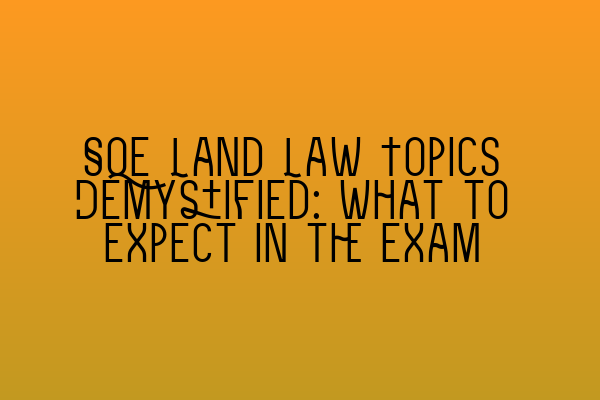SQE Land Law Topics Demystified: What to Expect in the Exam
As a leading solicitor firm, SQE Property Law & Land Law understands the importance of preparing for the Solicitors Qualifying Examination (SQE) in order to become a qualified solicitor. One key area that aspiring solicitors will encounter in the exam is Land Law.
Land Law is a fundamental topic in legal practice, encompassing various principles and concepts that govern the ownership, use, and transfer of land. In this blog post, we will demystify the Land Law topics that you can expect to encounter in the SQE exam, providing you with valuable insight and helping you prepare effectively.
1. Freehold and Leasehold Estates
The concept of ownership is the cornerstone of Land Law. Understanding the distinctions between freehold and leasehold estates is crucial. Freehold estates grant the owner full ownership rights for an indefinite period, while leasehold estates provide the right to use and occupy the land for a fixed term. It’s important to comprehend the rights and obligations associated with each type of estate.
Related Article: SQE 1 Practice Mocks FLK1 FLK2
2. Co-ownership and Trusts of Land
Co-ownership arises when two or more individuals jointly own a property. Understanding the different forms of co-ownership, such as joint tenancy and tenancy in common, is essential. Additionally, the concept of trusts of land, where the legal and beneficial interests in the property are held separately, should be thoroughly understood.
Related Article: SQE 2 Preparation Courses
3. Easements and Covenants
Easements are rights granted over another person’s land, allowing the holder certain privileges, such as rights of way or rights to light. Covenants, on the other hand, are promises to do or refrain from doing something in relation to the land. Understanding the creation, enforcement, and discharge of easements and covenants is essential when dealing with property transactions and disputes.
4. Registration of Land
The registration of land plays a vital role in modern Land Law. Learning about the registration process, including the Land Registry’s functions, benefits, and requirements, is crucial. It’s important to understand the different types of title deeds, the significance of priority dates, and the implications of registered and unregistered land.
5. Landlord and Tenant Law
Landlord and Tenant Law governs the legal relationship between landlords and tenants. Understanding the key concepts, rights, and obligations involved is essential. Topics such as lease negotiations, rent reviews, eviction procedures, and leasehold enfranchisement should be studied in detail.
Related Articles:
– SQE 1 Practice Exam Questions
– SQE 1 Preparation Courses
6. Adverse Possession
Adverse possession refers to the acquisition of another person’s land through continuous and uninterrupted possession for a specified period. Understanding the requirements, defenses, and legal implications of adverse possession is crucial.
7. Mortgages and Security
Mortgages and security interests play a vital role in property transactions. Understanding the different types of mortgages, their creation, enforcement, and discharge, is essential. Topics such as foreclosure, redemption, and priority of interests should be thoroughly studied.
In Conclusion
By familiarizing yourself with these key Land Law topics, you can approach the SQE exam with confidence. Remember to practice using SQE 1 Practice Exam Questions and take advantage of SQE 1 Practice Mocks FLK1 FLK2 to enhance your understanding and test your knowledge. For comprehensive preparation, consider enrolling in our SQE 2 Preparation Courses and SQE 1 Preparation Courses.
For the latest updates on exam dates and other relevant information, check the official SRA SQE Exam Dates page.
Good luck with your SQE Land Law preparations!
